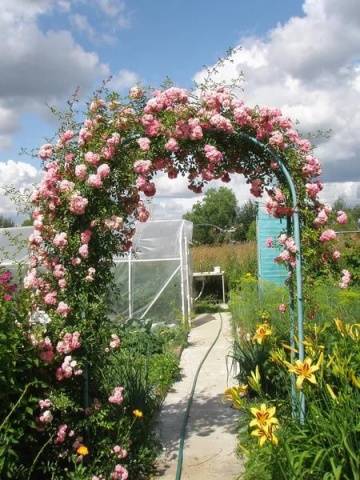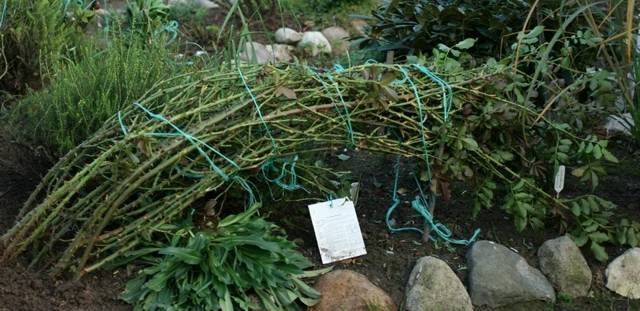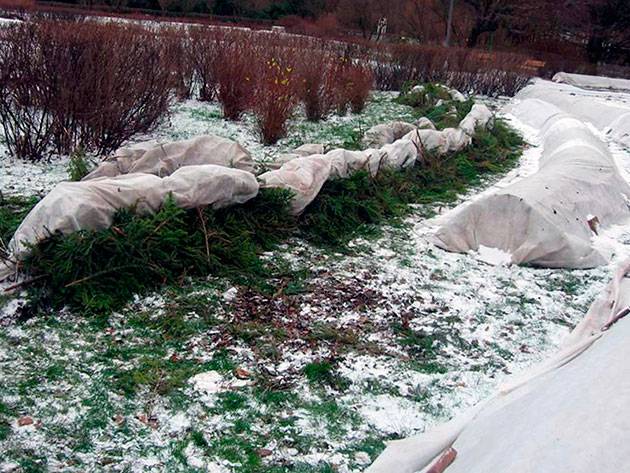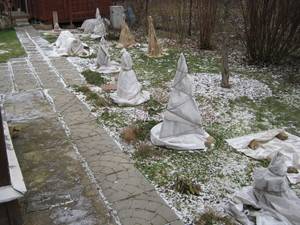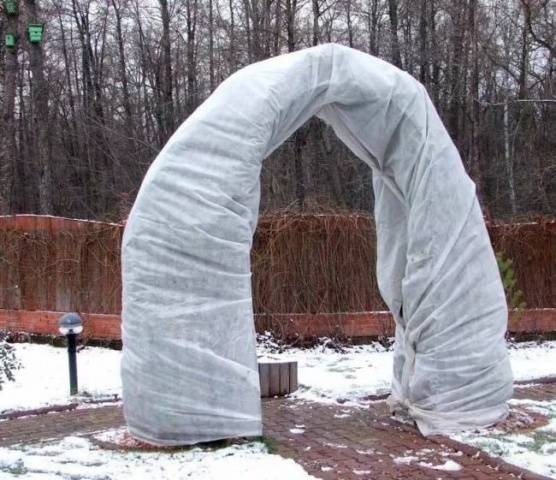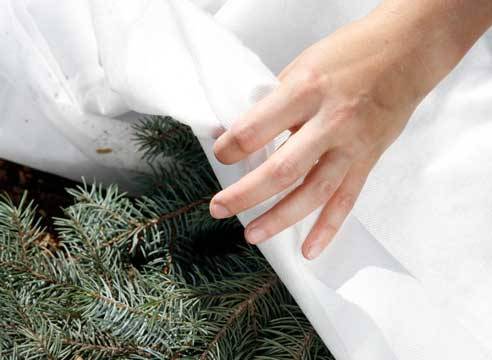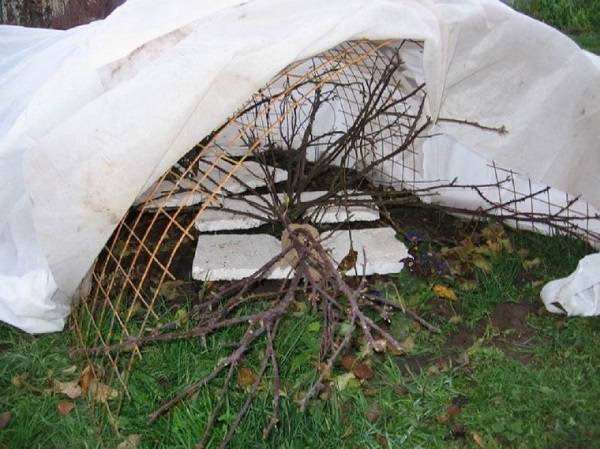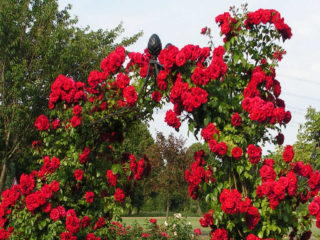Content
It is difficult to find a person who would not admire roses, their buds and fragrances. If earlier these plants were grown only in the southern regions of Russia, today these flowers are finding a new place of residence in the Urals, Siberia, Moscow region. Climbing roses, capable of curling on a trellis, also settled on the plots of residents of the Moscow region.
Often it is written on the packaging that the variety is winter-hardy. Inexperienced gardeners living in the Moscow region "peck" at him and do not cover the rose bushes for the winter. As a result, the flowers are irretrievably lost. After all, winter frosts and thaws destroy not only the buds, but also the root system. About, how to cover roses for the winter in the Moscow region, what covering materials to use, we will tell in the article.
Why do you need to cover roses
Modern rose varieties have practically no dormant period. Even at the very end of autumn, they can have buds, flowers and leafy shoots. In a word, sap flow continues.
What happens to climbing roses when the temperature in the Moscow region and other regions of central Russia drops below 0 degrees:
- The accumulated juice freezes and tears tissue. There are, as the people say, frost breakers. Instead of liquid, ice forms in these cracks.
- Pathogens penetrate through the damaged epidermis. They will begin to multiply vigorously at the slightest above-zero temperature.
- And the juice, thawed, will begin to flow from the trunks of climbing roses. As a result, the plants turn out to be dry in spring, unable to bloom, even foliage will not appear on it. It's good if the root system goes away. Otherwise, you will have to uproot the plant.
The shelter, including in the Moscow region, saves plants from frost and disease. But before you cover the roses for the winter in the Moscow region, you will have to start preparing them.
Preparation for wintering
To prevent climbing roses in the Moscow region from dying in winter, they must be specially prepared before the shelter. As a rule, preparation begins in the month of August.
Top dressing
First of all, the plants need to be fed. Fertilizers containing nitrogen are not suitable for the autumn feeding of climbing roses, since they will cause a violent growth of the green mass. It is best to use potassium-phosphorus fertilizing so that the shoots can ripen well before the onset of cold weather.
The fertilizer rates indicated below are diluted in 10 liters of water. This amount is enough for four square meters. For the first autumn top dressing in early August, the following are added under the plants:
- superphosphate - 25 g;
- boric acid - 2.5 g;
- potassium sulfate - 10 g.
The second feeding is carried out in early September with superphosphate (15 g) and potassium sulfate (15 g). Also bred in a ten-liter bucket.
Other preparation operations
In August, the soil is loosened, the stems and buds are cut off so that the plants have the opportunity to go into a state of dormancy. Since September, climbing roses are practically not watered.
Back in August, the leaves from the bottom with petioles are cut off from climbing roses. The fact is that by the end of the season, it is the lower leaves that can be damaged by diseases, and pests hibernate on them. To prevent further spread, the leaves must be cut off. Each wound, so as not to get an infection, is treated with potassium permanganate or brilliant green. A good effect is given by powdering damage with wood ash.
The next day, you need to cover the roots with dry sand.Up to three buckets are consumed per adult plant, and one bucket is enough for a young plant. Such hilling protects the root system from freezing. After that, you need to cut off the remaining leaves, carefully remove the lashes from the trellis. Iron vitriol, diluted strictly according to the instructions, must be used to process all the lashes.
Until the thermometer scale has dropped below + 2- + 3 degrees, in dry weather they tie the lashes of rose bushes and bend them down. Why exactly at this temperature is it necessary to work with climbing roses? The fact is that their whips become fragile when frozen, they cannot be bent without damage.
It is best to work with rose bushes in pairs with an assistant. Having bent the bundles of lashes, they need to be pinned so that they do not rise again. Supports similar to the letter M or P are placed under each ligament.
Climbing roses will stay in this position until the first frost. A more substantial shelter is installed in the suburbs at a temperature of -4, -5 degrees.
How to cover roses in the Moscow region
Many gardeners, especially beginners, are concerned not only with how to cover rose bushes in the Moscow region for the winter, but also with what material. The best cover, of course, is snow. Unfortunately, snow doesn't fall by magic. In the suburbs or in other areas of central Russia, it can tumble at lower temperatures. Therefore, you need to think about how to save roses from frost.
Experienced gardeners advise using any materials at hand. Many harbor rose bushes in the Moscow region for the winter:
- dry leaves;
- spruce branches;
- burlap and rags;
- old blankets and jackets;
- boards, slate and plywood.
Today you can buy special covering materials that allow you to maintain the temperature, they do not form condensation destructive for roses, even during winter thaws:
- lutrasil;
- spunbond;
- geotextile.
The choice of material will depend on the state of climbing roses on the site, on the variety and age of the plants. Hardy winter-hardy roses winter well in the Moscow region under foliage or spruce branches. As for young plants, without shelter, they cannot overwinter without damage.
Improvised materials or various types of films for covering roses in the Moscow region, as a rule, are pulled over the frame. It can be made of wood or metal. The plastic version must be immediately swept aside, since this material crumbles in the cold.
The covering material should be dense, approximately 200 g / m². For reliability, it is laid on the frame in several layers. If you still decide to use plastic wrap to cover climbing roses in the suburbs, then leave vents on the sides. Otherwise, during thaws, plants can begin to dry out.
As for spunbond, lutrasil and geotextile, this material, after covering the bushes, is tightly fixed around the entire perimeter, holes are not needed. Frost should not penetrate under these covering materials.
It is possible to cover roses for the winter in the Moscow region not only horizontally, but also vertically, if you take modern materials. Like this.
If the plants grew on an arch, then you can cover them together in the same way as in the photo.
How to properly cover roses
After hilling and carrying out preparatory work, they begin to cover roses in the Moscow region. Since in many regions plants can damage mice, the ground is treated with special substances or sprinkled with mothballs. By the way, treatment with iron vitriol also helps to save climbing roses from rodents.
Frame shelter
Spruce branches or fallen leaves are laid under the lashes. These materials are breathable, roses will not suffocate from lack of oxygen. It is undesirable to cover the bushes with sawdust, straw or hay, as they absorb water and lead to condensation.
Spruce branches or leaves are also laid on top of the tied pink lashes. To prevent precipitation from falling, arcs or wooden shields in the form of a gable roof are installed over the roses. Stakes are used to fix the shelter.
Top on a wooden frame or arc covered covering material... At the beginning of autumn, it is not closed from the ends. Full cover on all sides is performed when the average daily temperature is below -5 degrees.
So, you can cover roses planted in one line. If the plants are scattered around the garden, then the work will increase significantly, since it will take longer for each rose to hide.
Shelter without frame
Many gardeners in the Moscow region shelter of roses carried out in a frameless way. This method takes less time. Plants are shifted with foliage or spruce branches, and covered with a film or roofing material on top. Experienced gardeners do not advise residents of the Moscow region to snatch climbing roses in this way, because the plants for the most part vomit.
We cover a climbing rose, gardener tips:
Conclusion
Hiding roses for the winter is an important agricultural technique, especially in the Moscow region and other regions of Russia, where the thermometer drops several tens of degrees below zero. Plants simply cannot survive without your attention and help.
No need to regret the time spent covering the rose bushes. Roses will thank you in spring, delight you with lush greenery and buds of fragrant flowers.
